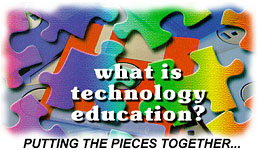

|
Defining the Concept:
Technology Education is an integrated, experience-based instructional program designed to prepare students to be knowledgeable about technology - its evolution, systems, technologies, utilization, and social and cultural significance. It results in the application of mathematics and science concepts to technological systems in areas such as, but not limited to: construction, manufacturing, communications, transportation, biotechnology, and power and energy. Students are challenged to discover, create, solve problems, and construct solutions by using a variety of tools, machines, computer systems, materials, processes and technological systems. |
|
The mission of Technology Education is to be organized around a set of concepts, processes, and systems that are uniquely technological. The program and course content is student centered and is designed to develop insights and understandings of the application of technological concepts, processes, and systems. All activities use hands-on experiences to motivate students to make connections between concepts and real-world applications. Students are challenged to use the technology education facility to design, apply materials, machines, instrumentation, processes, and technical concepts in an efficient and safe manner. Activities and lessons develop a student's problem-solving and decision-making abilities through the use of human and material resources, processes, and technological systems. Students will be prepared for life-long learning in a technological society because they will be exposed to activity-oriented laboratory experiences that reinforce abstract concepts with concrete experiences. This combined "know-how" and the "ability to do" in carrying out technological work transforms technological understandings, communication skills, language arts skills, social and societal understandings, mathematical concepts, and scientific knowledge into reality. |
Therefore, to implement the mission for technology education, three major initiatives
will be to provide:
|
|
A Vision For Technology Education
An integral part of the program of studies in Marlyand's schools, technology education is a new basic for all students. It is experience-based and involves the application of mathematics and science concepts in such techological systems as, but not limited to; construction, manufacturing, communications, transportation, biotechnology, and power and energy. Students work in teams to solve problems related to techology - its evolution, systems, techniques, utilization, and social and cultural significance. Students are taught how to utilize, interact, and live in a rapidly changing, high techological society. Technology education programs are among the first to demonstrate an integrated approach to learning in high school. Facilities and equipment are state-of-the-art as a result of partnerships with business and industry. Interdisciplinary teams of teachers train and work together for cross-curriculum planning and integrated delivery of instruction. Technology education is taught using a collaborative approach is which groups of students interact with teachers of mathematic, science, social studies, language arts, technology education and other disciplines. Cooperative learning, ingenuity challenges, modules, and computer-assisted instruction are some of the approaches used to provide students with hands-on learning experiences in which they can demonstrate established learning outcomes. In Montgomery County Public Schools the technology education program challenges all students to acquaint themselves with their techological environment so they are better prepared to make informed decisions about their lives and eagerly participate in controlling their own destiny. Programs recognize and capitalize on the individual's inherent potential for reasoning and problem-solving, for imagining and creation, for constructing and expressing by using implements and materials from which technology and industry spring. Thus, technology education is a fundamental curriculum for all students, regardless of learning levels, career choices, or life aspirations. Students graduate from high school with the understanding of how technology affects daily decision making; with the ability to use processes and systems, along with a variety of tools and resources to solve problems; and with the ability to apply and interrelate concepts in science, mathematics, language arts, and social studies to address practical issues in a technological society. Technology education teachers the concepts of tomorrow that enable students to turn their vision into reality today. Tomorrow belongs to those who effectively and creatively interact with technology today and dream of its possibilities for tomorrow. |
Home | Sci/Math | TE Prods | K12 Ed | TE Resources | Definition | Reference | Author | Grants | News | Credits
| Entire contents
Copyright ©
1996 - 2013 The Technology Education Lab. All rights reserved. |